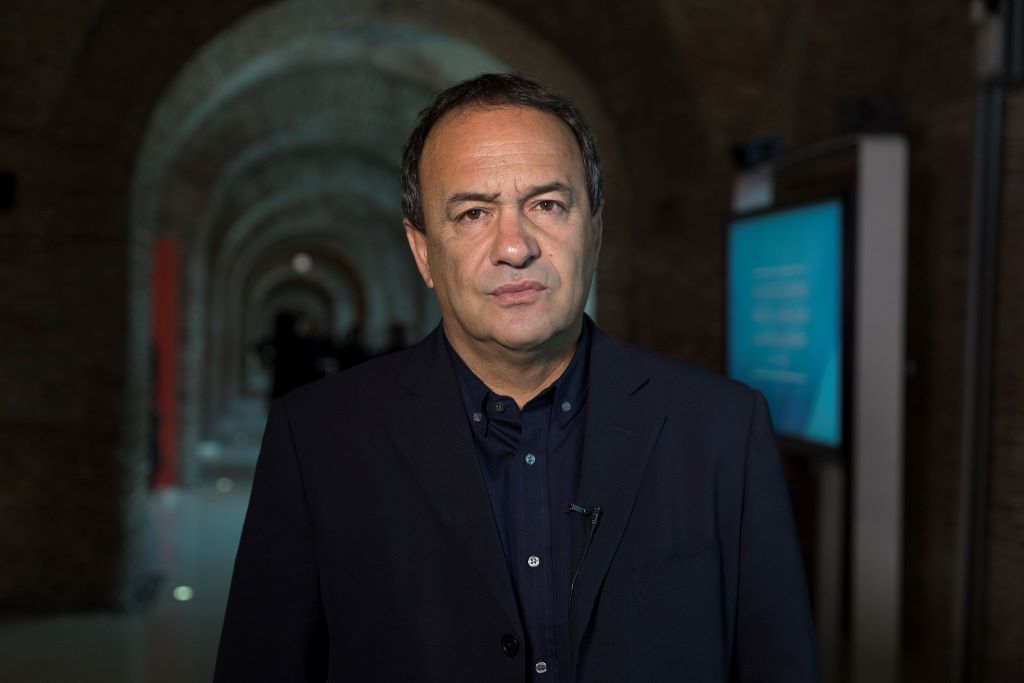Pro-Refugee Mayor Mimmo Lucano Is Being Jailed, But He Has Justice on His Side
Mimmo Lucano is famous as the Italian mayor who rejuvenated his long-abandoned town by allowing refugees to live in empty homes. Yesterday, he was sentenced to thirteen years in jail for the crime of helping human beings in need.

Domenico “Mimmo” Lucano, former mayor of Riace, Italy, photographed on July 3, 2017. (Soledad Amarilla / Ministry of Culture of Argentina via Flickr)
There are sentences which, beyond being unjust, and thus more than questionable, openly defy justice and our sense of what is fair, what is right, what ought to be. The verdict passed by the judges in Locri was not issued “in the name of the Italian people,” a large part of which is instead in shock and deeply angered today. Rather, this is a shameful conviction delivered by a repressive and xenophobic nation-state, which has for some time already been waging an undeclared war on migrants under the banner of sovereigntism and closed borders.
Various means have been deployed in this conflict: sequestering NGO rescue boats, indiscriminate pushbacks, having people tortured in Libyan camps, and leaving them to die at sea. But also striking against those citizens who won’t accept being complicit and who help those who arrive here. This is the context in which we should read the thirteen-year-long prison sentence against Mimmo Lucano — an eminently political decision. Not only because it is double the length of jail time sought by the prosecution, not only because it is the same as the sentence handed down to Luca Traini, the fascist who shot “blacks” (in the Macerata attack, which took place just weeks before the 2018 general election) or the sentence handed down to a member of the ’Ndranghetà (Calabrian mafia) with several crimes behind him. But also because it is an explicit message against anyone who dares to imitate his example in the future. The message is that those who welcome migrants are criminals.
And yet the question goes even further than migrant reception. To understand this, we should briefly look back to that summer day two decades ago when a sailboat heading from the Turkish coast was spotted at sea. Its cargo: Kurdish refugees who had escaped persecution. That was in July 1998. Suddenly, the forgotten town of Riace, stuck in the postwar decades, almost emptied out by emigration, asleep and resigned to the diktats of the world’s most powerful mafia, woke up to new life. The school reopened, the streets of the village were repopulated, abandoned houses were restored, and sales resumed in the shops.
Lucano, who had himself been an emigrant for some years, founded the Città Futura association upon his return home. It was inspired by the utopia of Tommaso Campanella, the philosopher who was born in Stilo (just a few miles from Riace) and died in Paris in 1634, after years of trials and imprisonment. Lucano was guided by the idea of overcoming private property. Riace became a common good for foreigners and residents. Countless initiatives were taken under the banner of this policy. Old houses in the village were given on loan to asylum seekers, while commercial activities were self-managed. The benefits were enjoyed by all. In 2001, Riace was the first municipality, together with Trieste, to introduce the system of accoglienza diffusa — migrants being welcomed into the homes of citizens across the territory. It soon crossed borders and the “Riace model” attracted attention everywhere. In 2010, director Wim Wenders celebrated it in his short film Il Volo. Lucano has received countless awards everywhere. In 2016, Fortune magazine listed him among the world’s fifty most important and symbolic political leaders. Riace became a point of reference for activists, intellectuals, and artists.
In 2017, as a threatening sovereigntist wind was picking up, first from Democratic Party interior minister Marco Minniti and then from Lega leader Matteo Salvini, a devious plan began to take shape, seeking to dismantle everything that had been built up in Riace. Funding for the municipality was cut, and Lucano, who had been mayor for three terms, was arrested and had numerous charges leveled against him. Two are worth noting that are especially serious, and telling: one, having facilitated the collection of waste by two cooperatives that employed immigrants; and two, having helped a Nigerian woman, whose child was seriously ill, to receive a residence permit through marriage. If there is talk of fraud, those who know Mimmo Lucano know of his honesty, his enormous sacrifices, his life of toil and hardship. Faced with the accusation of “aiding and abetting illegal immigration,” Lucano said: “If it is a crime to help those in difficulty, I plead guilty.”
Unfortunately, the consequences of the Locri verdict could be devastating both for Riace, where very little remains of the model that made the town famous far and wide, and for Mimmo Lucano, who, with understandable bitterness, said he was “dead inside.” Those enemy judges are defying all of us and our sense of justice. This sentence is a wound to justice itself, which goes far beyond the legalism of a miserable judicial system. Mimmo Lucano is not an outlaw, but an exemplary citizen who has always acted in the name of justice. Now, it’s up to us to respond to this shameful sentence with a mobilization of solidarity with Riace and with Mimmo.